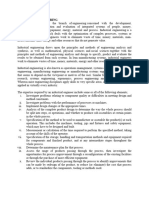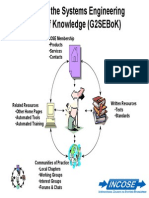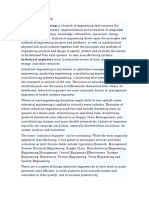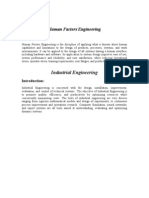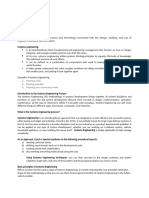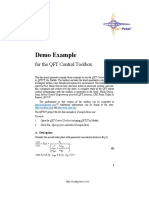0 ratings0% found this document useful (0 votes)
72 viewsEE 300: System Engineering Management (3+0) (Muhammad Ali Amir)
EE 300 is a 3 credit course on system engineering management taught by Muhammad Ali Amir in the fall 2014 semester. The course provides concepts, methodologies, models, and tools for a total life-cycle approach to systems engineering, design, analysis, and management. Topics covered include requirement definition, system concept exploration and development, design at various levels, system and technology simulations and verification, continuous evolution and improvement, configuration management, and business process modeling. Required textbooks include Systems Engineering: principles and practice by Kossiakoff and additional references on systems engineering tools, methods, models, and encyclopedias.
Uploaded by
Salman ZafarCopyright
© © All Rights Reserved
Available Formats
Download as PDF, TXT or read online on Scribd
0 ratings0% found this document useful (0 votes)
72 viewsEE 300: System Engineering Management (3+0) (Muhammad Ali Amir)
EE 300 is a 3 credit course on system engineering management taught by Muhammad Ali Amir in the fall 2014 semester. The course provides concepts, methodologies, models, and tools for a total life-cycle approach to systems engineering, design, analysis, and management. Topics covered include requirement definition, system concept exploration and development, design at various levels, system and technology simulations and verification, continuous evolution and improvement, configuration management, and business process modeling. Required textbooks include Systems Engineering: principles and practice by Kossiakoff and additional references on systems engineering tools, methods, models, and encyclopedias.
Uploaded by
Salman ZafarCopyright
© © All Rights Reserved
Available Formats
Download as PDF, TXT or read online on Scribd
You are on page 1/ 1
Fall2014
EE 300: System Engineering Management (3+0)
(Muhammad Ali Amir)
A practical introduction to systems engineering, design, analysis and management.
It shall provide the concepts, methodologies, models, and tools needed to understand
and implement systems for a total life-cycle approach.
It covers requirement definition, analysis, building of system concept. Concept
exploration, elaboration, and development, concept verification, system level
design, detailed design, at higher level, design at lower/component/material level
system level simulations and design verification, detailed technology simulations
and verification, continuous evolution and improvement in a system, engineering,
production and design change notes, complete design documents, production
engineering documents, shop floor documents and operator worksheets.
Management and control of the whole lifecycle processes, concept of configuration
management, List of forms, manuals, files and reports, methods and tools of
managing & controlling documents, overall management architecture, and
hierarchy.
And finally the concepts of business processes and the role of industrial and systems
engineering in business process modeling. The role of standardization and adopting
international standards for System Engineering processes.
Textbook: Systems Engineering: principles and practice Kossiakoff, William
N. Sweet. 2003, 2nd ed. ISBN 978-0-470-40548-2.
References: Systems Engineering Tools and Methods by Ali K. Kamrani &
Maryam Azimi, 2011 by Taylor and Francis Group, LLC, ISBN: 9781-4398-0926-6
Engineering design of systems: models and methods by Dennis M.
Buede. 2nd ed, John Wiley, ISBN 978-0-470-16402-0
Systems Engineering A 21st Century Systems Methodology, Derek
K. Hitchins, 2007 John Wiley & Sons Ltd,, ISBN 978-0470-05856-5
Handbook of systems engineering and management by Andrew P.
Sage and William Rouse 2nd ed. ISBN 978-0-470-08353-6
Encyclopedia of Complexity and Systems Science, 2009 Springer,
ISBN 978-0-387-75888-6
You might also like
- A SysML-based Methodology For Mechatronic Systems PDFNo ratings yetA SysML-based Methodology For Mechatronic Systems PDF14 pages
- 2.2 - Relevance and Benefits of Systems EngineeringNo ratings yet2.2 - Relevance and Benefits of Systems Engineering8 pages
- Behavior Model, Create A Structure Model, Perform Trade-Off Analysis, and Create Sequential Build & Test PlanNo ratings yetBehavior Model, Create A Structure Model, Perform Trade-Off Analysis, and Create Sequential Build & Test Plan22 pages
- Case Study: B2B E-Commerce System Specification and Implementation Employing Use-Case Diagrams, Digital Signatures and XMLNo ratings yetCase Study: B2B E-Commerce System Specification and Implementation Employing Use-Case Diagrams, Digital Signatures and XML9 pages
- AAE - 3156 - Avionics - System Engineering LectureNo ratings yetAAE - 3156 - Avionics - System Engineering Lecture33 pages
- Evaluating Office Systems: Some Comments and General Guidelines .INo ratings yetEvaluating Office Systems: Some Comments and General Guidelines .I10 pages
- Lecture 3, Fundamentals of Systems (عرض تقديمي)No ratings yetLecture 3, Fundamentals of Systems (عرض تقديمي)12 pages
- Industrial Engineering Is A Branch of Engineering That Concerns TheNo ratings yetIndustrial Engineering Is A Branch of Engineering That Concerns The1 page
- Management Engineering Discussion PaperNo ratings yetManagement Engineering Discussion Paper21 pages
- 1.1 Evolution of Industrial Engineering and Its FunctionsNo ratings yet1.1 Evolution of Industrial Engineering and Its Functions5 pages
- Human_Factors_in_the_Design_and_EvaluatihNo ratings yetHuman_Factors_in_the_Design_and_Evaluatih5 pages
- The Six Principles of Systems Engineering (Articulo de IBM)No ratings yetThe Six Principles of Systems Engineering (Articulo de IBM)3 pages
- Industrial Engineering and Its RelevanceNo ratings yetIndustrial Engineering and Its Relevance25 pages
- A Brief View of Model Based Systems Engineering MethodologiesNo ratings yetA Brief View of Model Based Systems Engineering Methodologies6 pages
- Business Framework: Operation Management Framework in It Architectural ProcessNo ratings yetBusiness Framework: Operation Management Framework in It Architectural Process5 pages
- System Design: Modeling and Detection of Camouflaging Worm 2012No ratings yetSystem Design: Modeling and Detection of Camouflaging Worm 201223 pages
- 6 - Malabay - CCR210 - 102018 - SYSTEM - ENGGINEERING PDFNo ratings yet6 - Malabay - CCR210 - 102018 - SYSTEM - ENGGINEERING PDF16 pages
- Chapter-1---Introduction-to-design-optimiza_2025_Introduction-to-Optimum-DesNo ratings yetChapter-1---Introduction-to-design-optimiza_2025_Introduction-to-Optimum-Des16 pages
- Introduction To Modeling and Simulation TechniquesNo ratings yetIntroduction To Modeling and Simulation Techniques7 pages
- A Comparative Case Study of Functional Models To Support System Architecture DesignNo ratings yetA Comparative Case Study of Functional Models To Support System Architecture Design13 pages
- Introduction To Modeling and Simulation TechniquesNo ratings yetIntroduction To Modeling and Simulation Techniques7 pages
- CS-4347 - Introduction To Software Engineering: Sikandar S. ToorNo ratings yetCS-4347 - Introduction To Software Engineering: Sikandar S. Toor22 pages
- Essential Guide to Operations Management: Concepts and Case NotesFrom EverandEssential Guide to Operations Management: Concepts and Case NotesNo ratings yet
- 32 IJTPE Issue18 Vol6 No1 Mar2014 pp204 209No ratings yet32 IJTPE Issue18 Vol6 No1 Mar2014 pp204 2096 pages
- A Protection Coordination Index For Evaluating Distributed Generation Impacts On Protection For Meshed Distribution SystemsNo ratings yetA Protection Coordination Index For Evaluating Distributed Generation Impacts On Protection For Meshed Distribution Systems10 pages
- 6Wxg/Rq6Hohfwlrqri6) &/ V, Pshgdqfhiru 3Urwhfwlrq&Rruglqdwlrqzlwk2Yhufxuuhqw5Hod/ Lqd'Lvwulexwlrq6/VwhpNo ratings yet6Wxg/Rq6Hohfwlrqri6) &/ V, Pshgdqfhiru 3Urwhfwlrq&Rruglqdwlrqzlwk2Yhufxuuhqw5Hod/ Lqd'Lvwulexwlrq6/Vwhp4 pages
- Radiation Interaction and Detection: Alpha & Beta DecayNo ratings yetRadiation Interaction and Detection: Alpha & Beta Decay6 pages
- Band-Pass Filtered, Inverting - 40 DB Attenuator, 10 HZ - 100 KHZ, 0.1 DB ErrorNo ratings yetBand-Pass Filtered, Inverting - 40 DB Attenuator, 10 HZ - 100 KHZ, 0.1 DB Error20 pages
- 100 HZ To 100 KHZ Band Pass Filter: D68Hplp SeriesNo ratings yet100 HZ To 100 KHZ Band Pass Filter: D68Hplp Series6 pages













